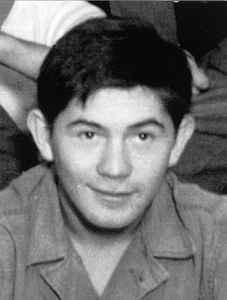Wilder, Harold Dean
Army Private
Harold Dean Wilder from Virginia, Lee county.
Service era: Korea
Date of death: Unknown
Death details: On July 11, 1950, the U.S. Army’s 21st Infantry Regiment, which had arrived in Korea six days earlier, was placed in defensive positions near the town of Chochiwon, South Korea. The regiment was not at full strength and lacked artillery and anti-tank weapons. That day, they were attacked by North Korean forces and were forced to withdraw to avoid being surrounded, as well as to buy time until they could be reinforced and resupplied. Private First Class Harold Dean Wilder, who joined the U.S. Army from Virginia, served with L Company, 3rd Battalion, 21st Infantry Regiment, 24th Infantry Division. He was captured by enemy forces on July 11 during the delaying actions between Pyongtaek and Chochiwon. He was forced to march to prison camp number 5 on the Yalu River in North Korea, where he died of malnutrition on an unspecified date in February 1951. Although he was buried near the camp, his remains were not identified among those returned to U.S. custody after the ceasefire. Today, Private First Class Wilder is memorialized on the Courts of the Missing at the National Memorial Cemetery of the Pacific.
Source: National Archives, Defense POW/MIA Accounting Agency
 Death details: On July 11, 1950, the U.S. Army’s 21st Infantry Regiment, which had arrived in Korea six days earlier, was placed in defensive positions near the town of Chochiwon, South Korea. The regiment was not at full strength and lacked artillery and anti-tank weapons. That day, they were attacked by North Korean forces and were forced to withdraw to avoid being surrounded, as well as to buy time until they could be reinforced and resupplied. Corporal Raymond Leroy Woodring, who joined the U.S. Army from Pennsylvania, served with I Company, 3rd Battalion, 21st Infantry Regiment, 24th Infantry Division. He was captured by enemy forces north of Chochiwon on July 12 and was marched with other prisoners toward the Apex prison camps in North Korea. He died en route on an unspecified day as his group of prisoners moved through Chasong Pass, but the other prisoners were not allowed to stop long enough to bury him. His remains were not identified among those returned to U.S. custody after the war, and he is still unaccounted for. Today, Corporal Woodring is memorialized on the Courts of the Missing at the National Memorial Cemetery of the Pacific.
Death details: On July 11, 1950, the U.S. Army’s 21st Infantry Regiment, which had arrived in Korea six days earlier, was placed in defensive positions near the town of Chochiwon, South Korea. The regiment was not at full strength and lacked artillery and anti-tank weapons. That day, they were attacked by North Korean forces and were forced to withdraw to avoid being surrounded, as well as to buy time until they could be reinforced and resupplied. Corporal Raymond Leroy Woodring, who joined the U.S. Army from Pennsylvania, served with I Company, 3rd Battalion, 21st Infantry Regiment, 24th Infantry Division. He was captured by enemy forces north of Chochiwon on July 12 and was marched with other prisoners toward the Apex prison camps in North Korea. He died en route on an unspecified day as his group of prisoners moved through Chasong Pass, but the other prisoners were not allowed to stop long enough to bury him. His remains were not identified among those returned to U.S. custody after the war, and he is still unaccounted for. Today, Corporal Woodring is memorialized on the Courts of the Missing at the National Memorial Cemetery of the Pacific.